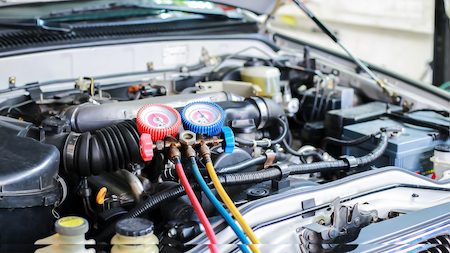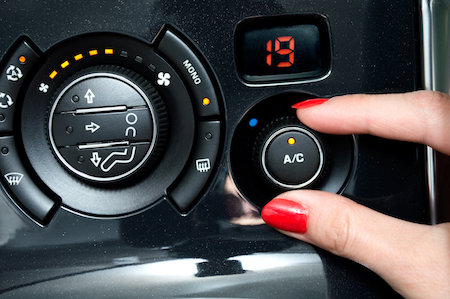We all love staying cool on the hottest days of the year. But what you don’t know about your car’s air conditioner might be hurting the environment.
In order to produce cooled air, your car requires refrigerant in the system. If it’s working well, your car will be fully operational, delivering cool air. As a car ages, that can change. Suddenly, a 90-degree day occurs, and you notice your air conditioner isn’t working as it should. It might be the refrigerant, which impacts more than the cold air inside your car.
Your car’s air conditioner relies heavily on refrigerant to keep you cool on hot summer days. However, there are times when your air conditioner may not be cooling your car as it should, or you may notice weird smells or noises. At times like these, it’s essential to find and fix the issue quickly because leaking refrigerant can cause lasting harm to the environment.
How Your Car’s Air Conditioner Works
Before diving into refrigerant’s impact, it’s important to understand how a car’s air conditioner works.
A car’s air conditioning system removes heat and moisture from the air inside the vehicle, resulting in cooler and drier air.
It starts with the compressor. The air conditioning system is powered by a belt-driven compressor, typically located on the engine. The compressor circulates refrigerant throughout the system.
The refrigerant plays a crucial role in the air conditioning process. It’s a chemical compound with properties that allow it to change from a gas to a liquid and vice versa at relatively low temperatures. The most common refrigerant used in cars is currently R134a, though newer vehicles may use a more environmentally friendly alternative, such as R1234yf.
The refrigerant starts in a gaseous state and enters the condenser, usually located at the front of the car. The condenser cools the refrigerant by transferring heat to the outside air. As a result, the refrigerant condenses into a high-pressure liquid.
The high-pressure liquid refrigerant passes through an expansion valve, which reduces its pressure and converts it into a low-pressure mixture of liquid and vapor. This expansion causes a significant drop in temperature.
The cool, low-pressure refrigerant enters the evaporator, typically inside the dashboard. The warm air from the car’s interior is blown over the evaporator’s fins. The refrigerant absorbs heat from the air, causing the refrigerant to evaporate and turn back into a gas.
The cool air is blown by a blower fan, powered by the car’s electrical system, and directed through the vents into the car’s cabin. This provides the desired cooling effect.
The gaseous refrigerant returns to the compressor, and the cycle starts again. The compressor pressurizes the gas, and the process repeats, continually cooling the air inside the car until the desired temperature is reached.
It’s important to note that the air conditioning system also dehumidifies the car’s air. When warm air passes over the cold evaporator, moisture condenses on the evaporator’s surface, reducing the humidity inside the vehicle.
4 Signs the Air Conditioner Needs Help
It’s easy to notice an air conditioning system that isn’t at peak performance.
- Blowing Warm Air – If your air conditioner is blowing warm air, this could indicate a refrigerant leak. When there’s a leak, there is insufficient refrigerant to cool the air, causing it to blow warm.
- Weird Noises – Strange noises usually indicate a problem with the compressor. The refrigerant could be too low or pooling in specific areas, causing damage to the system.
- Nasty Smells – When mold or bacteria grow in the evaporator, they release an unpleasant odor into the car’s air. Removing these smells can be challenging and sometimes require a complete system overhaul.
- Visible Refrigerant Leaks – If you notice oily or greasy spots on your driveway or around certain parts of your car, your air conditioner may have a refrigerant leak. It’s best to get this checked by a professional because refrigerant harms the environment.
The Difference Between R134a and R1234yf Refrigerant
In the past, R134a refrigerant was the standard refrigerant used in cars. However, modern cars now use R1234yf refrigerant, which is more eco-friendly and less environmentally harmful.
Pay particular attention to what your car currently uses. R134a and R1234yf refrigerants should not be mixed because they have different properties. Doing so could cause serious system damage.
What a Refrigerant Leak Can Do to the Environment
A refrigerant leak can have several negative impacts on the environment.
Ozone Depletion – Many refrigerants used in older car air conditioning systems, such as R12 (Freon), contain chlorofluorocarbons (CFCs) or hydrochlorofluorocarbons (HCFCs). These chemicals are known to be ozone-depleting substances. When released, these substances can reach the upper layers of the atmosphere and contribute to the depletion of the ozone layer. The ozone layer helps protect the Earth from harmful ultraviolet (UV) radiation. Its depletion can lead to increased UV exposure, which has various detrimental effects on human health and the environment.
Global Warming Potential – Many refrigerants, including the commonly used R134a, belong to a class of chemicals known as hydrofluorocarbons (HFCs). HFCs have a high global warming potential (GWP), meaning they significantly impact climate change when released into the atmosphere. HFCs trap heat in the atmosphere, contributing to the greenhouse effect and global warming. In recent years, efforts have been made to transition to more environmentally friendly refrigerants with lower GWPs, such as R1234yf, which has a much lower impact on climate change.
Air Quality – Refrigerant leaks can also impact local air quality. When refrigerants escape into the air, they can contribute to the formation of ground-level ozone, a harmful air pollutant. Ground-level ozone can cause respiratory problems, especially for people with asthma or other respiratory conditions. Additionally, refrigerants may react with other contaminants in the atmosphere, leading to the formation of secondary pollutants that can be harmful to human health and ecosystems.
To mitigate these environmental impacts, it is essential to address refrigerant leaks promptly. Regular maintenance and inspection of car air conditioning systems can help detect and fix leaks. It is also important to ensure proper disposal and recycling of old refrigerants to prevent their release into the environment.
It’s Time to Get Your Car’s Air Conditioner Ready for Summer Heat
Your car air conditioner is a lifesaver, but it can also cause severe environmental damage if not cared for properly. Regular checks, maintenance, and prompt action can help keep your air conditioner running smoothly and reduce your ecological footprint.
If you notice any of the above signs or suspect a refrigerant leak, please take precautions and contact a professional. Working together can help reduce environmental damage and keep the air we breathe safe and clean.


 Imagine a sludgy, sticky, dark goo slowly flowing inside your car’s internal workings. As the refrigerant in your car’s air conditioning system breaks down, it slowly moves inside the compressor.
Imagine a sludgy, sticky, dark goo slowly flowing inside your car’s internal workings. As the refrigerant in your car’s air conditioning system breaks down, it slowly moves inside the compressor.